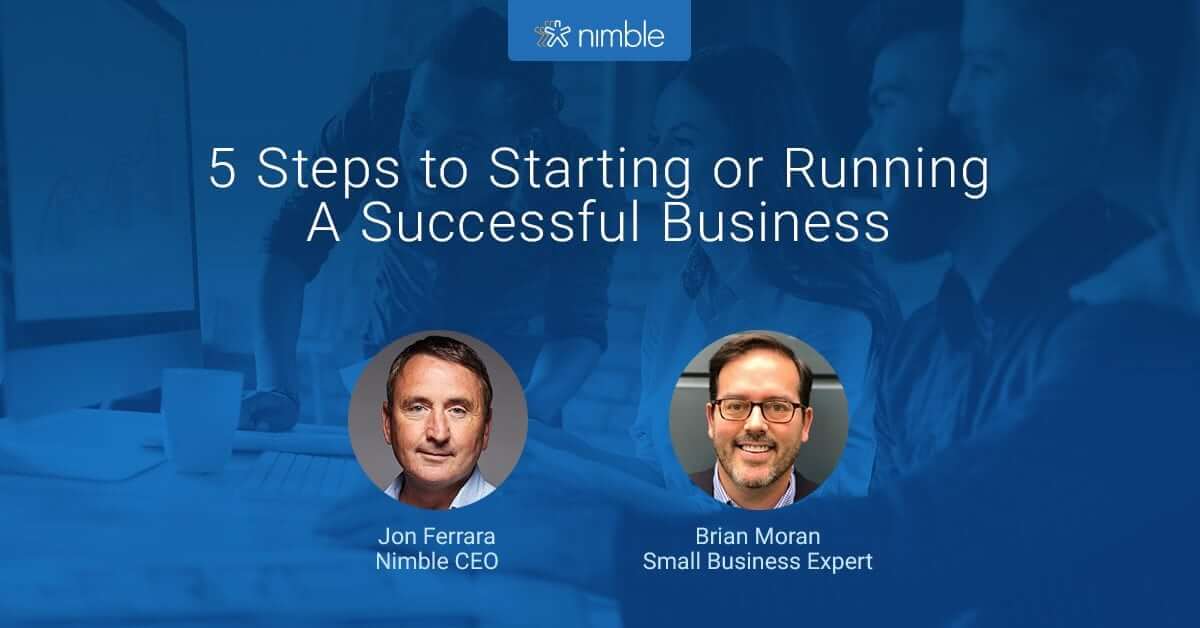In this webinar, Jon Ferrara discusses business creation and growth with Brian Moran, founder and CEO of Brian Moran and Associates. Brian is a business leader who is passionate about helping entrepreneurs and marketers navigate small and mid-sized business challenges.
Commitment is the most important conviction you should carry with you throughout your business launch. Although a third of businesses fail within their first three years, those who make it past the fifth have about the same success rate as their larger competitors. Once you spark the motivation to excel in the first couple years of growing a business, your success rate is no worse and no greater than your larger competitors.
Reactive Vs. Proactive
Reactive people only see a few feet in front of them. They’re in the weeds of business, meaning that they see themselves as constantly putting out fires. A proactive person will spend at least a couple of hours a week to take a 360 degree view of their business so they can see where they are now, where they’ve been, and (most importantly) where they’re going. They have a “map;” they know where to go, where the pitfalls are, and how to get to their goals.
Thirdly, there are predictive people. These sorts of people are very rare, as the business world tends to move too quickly for this degree of planning. They move at 90 miles per hour. They’ve already envisioned their path, so they know exactly which path to take at any fork in the road. They perceive the future in order to take advantage of it. Predictive people tend to be the most successful.
What to Include in Your Operational Plan
State your strategic goal, first and foremost. This is a living, breathing, document which is checked and updated regularly. You and your team should constantly be returning to it to check your progress. In terms of your GPS plan, it’s important to be extremely detailed and hold yourself accountable.
You should be discussing and thinking about all of the “what-if’s.” These include: what if we lose our largest customer? What if I lost my best salesperson? What if our building burns down? Always make sure to have a back-up plan to make sure you’re prepared for any situation.
What You Need to Understand about Your Competitive Landscape
Many companies fail to understand what their competition has to their advantage. At a certain point, you can no longer simply claim you’re better than the competition – you must explain why. Ask your customers why they chose you over the competition, and use that to fine-tune your strengths and continue to grow.
Make a spreadsheet listing all of current your customers or clients, and ask every 100th customer the one word that they believe sets you apart from the competition. Is it convenience? Quality? Something else? You’ll get a variety of different answers, which is incredibly important in order to understand the competitive landscape of your industry.
Make Changes When You Encounter Roadblocks
When something happens to throw you off your path, do you have a plan B? The Harvard Business Review carried out a study that observed businesses in places which underwent extremely harmful natural disasters. Roughly one third of all these businesses affected by natural disasters never opened their doors again because they didn’t have a back-up plan. The small portion of affected businesses that reopened were in business for less than two years before failing. You must always be thinking about ways to change your approach to internal and external aspects of your business in order to be prepared for anything.
Your network is crucial. Who are the people in your company that help you make some of the biggest decisions in your business? Set up a monthly meeting with these people so you can look at your business from 20,000 feet. It’s essential to have these extra sets of eyes and ears to see the things you might miss. Share your GPS plan in terms of its current status and where you’d like to see it go. Delegate tasks among your trusted colleagues in order to really take your business to the next level. This will also help you retain your employees, as they will recognize how important they are to your company.

